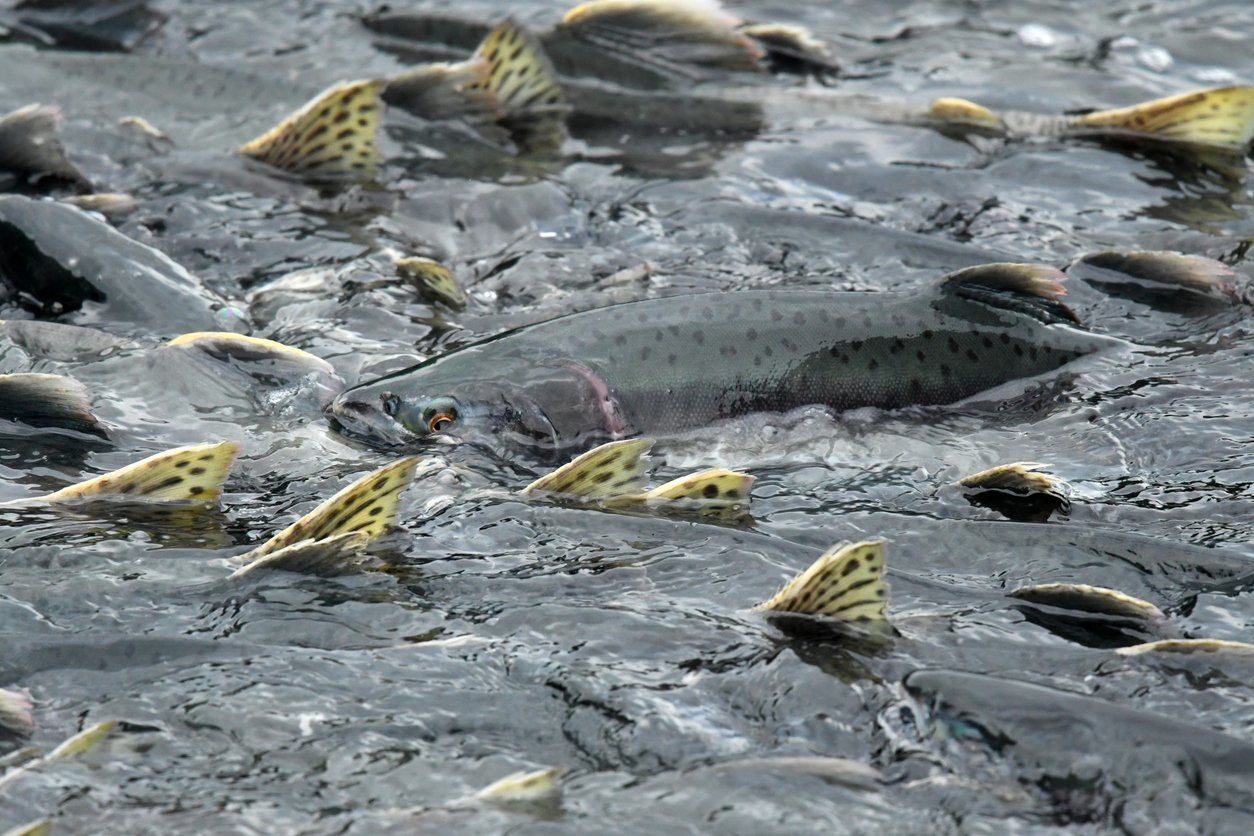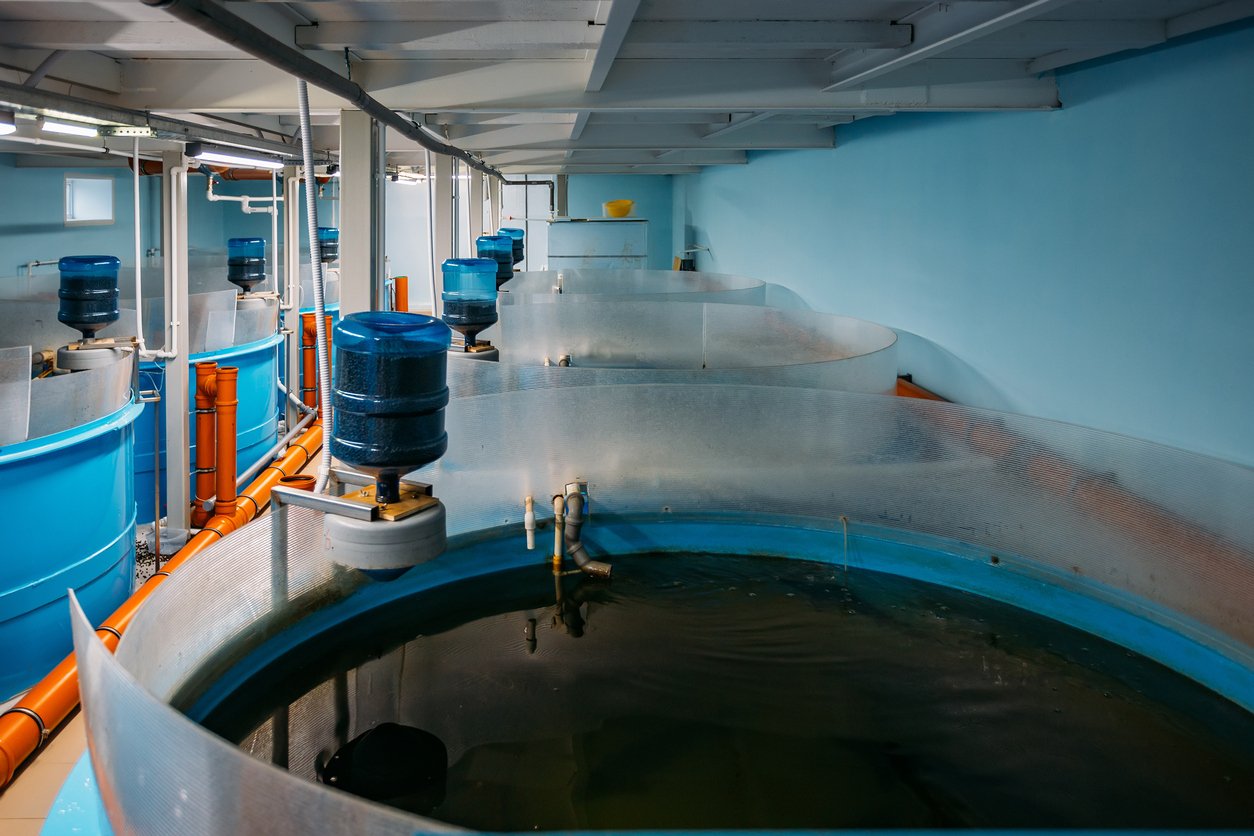Originally Published as a Press Release by Friends of the Earth
Following decades of controversy, widespread market rejection, and legal and regulatory challenges, US-based biotechnology and aquaculture company AquaBounty Technologies announced it will stop producing all genetically engineered (GE) AquAdvantage salmon, cull all its remaining fish, and close its last working facility.
After selling its fish farm in Indiana earlier this year and putting its other major site in Canada up for sale (at Rollo Bay, Prince Edward Island), AquaBounty announced yesterday that it is shutting its remaining GE salmon facility in North America (at Bay Fortune in Prince Edward Island, Canada). The company says it does not have sufficient liquidity to maintain the operation.
“This company was propped up by the hype but had nothing of value to sell. Genetically engineered food is a losing investment,” said Lucy Sharratt, Coordinator of the Canadian Biotechnology Action Network.
Genetically Engineered Salmon Pose Many Risks

A growing body of science suggests that GE salmon may pose serious environmental and public health risks, including potentially irreversible damage to wild salmon populations critical to the livelihoods, cultural heritage, and well-being of Indigenous and fishing communities.
AquaBounty was producing genetically engineered Atlantic salmon, the world’s first commercialized GE animal food intended for direct human consumption. The salmon was engineered with a growth hormone gene from Chinook salmon and genetic material from ocean pout.
“The development of GE salmon violates Wild Salmon and all the human and more-than-human communities that Wild Salmon supports. Wild Salmon underpins our cultural, spiritual, emotional, and physical well-being as Indigenous Salmon Peoples. We need to build on this victory to ensure that no other company takes up the colonial project of genetically engineering salmon,” said Carl Wassilie, a Yup’ik biologist, co-founder of Salmonberry Tribal Associates, and organizer with the Block Corporate Salmon campaign.
Consumer opposition to genetically engineered animals is high in the US and Canada. Polls in the US show that many Americans believe GE animals for protein production are not an appropriate use of biotechnology. Most consumers won’t eat genetically engineered fish if it is available, and 95% of consumers believe genetically engineered food animals should be labeled.
Successfully Blocking the Sale of GE Salmon to Consumers
Due to environmental and health concerns, consumer rejection, and an ongoing campaign led by Indigenous peoples and environmental groups, grocery retailers, food service companies, and major restaurants committed to not selling genetically engineered AquAdvantage salmon. The marketing campaign was run by Friends of the Earth, Block Corporate Salmon, North American Marine Alliance, Community Alliance for Global Justice, Canadian Biotechnology Action Network, American Anti-Vivisection Society, Center for Food Safety, and allies. The campaign moved more than 80 grocery retailers to reject GE salmon, including Walmart, Costco, Albertsons, and Kroger; food service companies Sodexo, Aramark, and Compass Group; and restaurant chains, including Red Lobster and Legal Seafood.
“Genetically engineered salmon is unwanted, risky, and unnecessary,” said Dana Perls, Food and Technology senior program manager at Friends of the Earth US. “People deserve the right to know what they are eating and have made the choice to reject GE salmon. Instead of genetically engineered animals designed to fit into industrial systems, we need sustainable wild salmon that supports fishing, Indigenous communities, and our environment.”
AquaBounty’s Legal Trouble

Public challenges in Canada and the US have long plagued the company. In 2020, a US federal judge ruled that the FDA’s approval of GE salmon violated environmental laws, in response to a lawsuit filed by environmental, consumer, and fishing groups, and the Quinault Indian Nation. This past September, the FDA released an amended environmental assessment of AquaBounty’s Bay Fortune and Rollo Bay facilities in Prince Edward Island.
“It’s heartening to see we’ve dodged this bullet. If AquAdvantage had made it to market, it would have set a dangerous precedent, opening the floodgates to more GE animal products. This is a false solution that distracts from the real issue at hand, which is unfettered corporate control over our food systems,” said Jon Russell, organizing coordinator of the North American Marine Alliance.
In a 2022 whistleblower report titled “AquaBounty Exposed,” a former employee at the Indiana site shared evidence of food and worker safety violations, animal welfare concerns, and routine environmental and water contamination infractions. AquaBounty sold this US facility at a loss in July 2024.
Shutting Down Farming Facilities
In February 2023, AquaBounty announced it was closing its second genetically engineered salmon production facility at Rollo Bay, Prince Edward Island. The building went up for sale in September 2024. The company is now also shutting down its smaller, remaining facility at Bay Fortune in Prince Edward Island, which it said would produce genetically engineered salmon eggs for its not-yet-built facility in Ohio.
“If AquAdvantage had made it to market, it would have set a dangerous precedent, opening the floodgates to more GE animal products.”
Construction of the Ohio operation has been on hold since 2023, and the company has been selling equipment from the site. Recently, AquaBounty announced it is looking for “alternatives for our Ohio farm project.” Residents have fought the proposed Ohio project for years, raising concerns about groundwater contamination.
“We hope these announcements ring the death knell for AquaBounty’s proposed facility in Pioneer, Ohio. Over the last few years, we’ve built a strong grassroots movement locally to oppose this facility. Its operations would threaten the Michindoh Aquifer and St. Joseph River, key sources of drinking water for our communities in Ohio, Indiana, and Michigan,” said Sherry Fleming, organizer with the Williams County Alliance in Ohio.
A Victory for People and the Planet
“Companies like AquaBounty claim that they want to ‘feed the world,’ yet they displace local food systems in favor of the global industrial food system, and they show no respect for the wild ecosystems and animals that community-based, artisanal, and traditional fisherfolks like myself rely on to feed our communities. If they truly cared about feeding people, they wouldn’t be wiping out the livelihoods of community-based food producers,” said Jason Jarvis, an artisanal fisherman and founder of Quonochontaug Fish Company, a fishermen’s cooperative in Rhode Island.
“While the demise of the AquaBounty salmon is a landmark victory for public health and the environment, the specter of future similarly wrongheaded GE food animals remains. We will be pushing the new administration to deny any future approvals of GE food animals, among other efforts to keep our food supply safe,” said Jaydee Hanson, policy director at the Center for Food Safety.
“GE salmon was always a false solution. We know that if we breach the dams, the salmon come back en masse. Breach the dams, restore salmon habitat, regulate factory trawlers, decenter industrial aquaculture from policy, build local infrastructure so fishers can distribute their fish more widely, and invest in fishing communities! Those are real policy solutions,” said Estefania Narvaez, organizer with Block Corporate Salmon.
For more information about the health and environmental impacts of genetically engineered (also known as bioengineered) foods, check out our full article here.
Tell us in the comments:
- What is your opinion about genetically engineered food?
- How do you feel about the news of AquaBounty’s closure?
Featured Image: iStock.com/Javier Lizarazo Guerra

